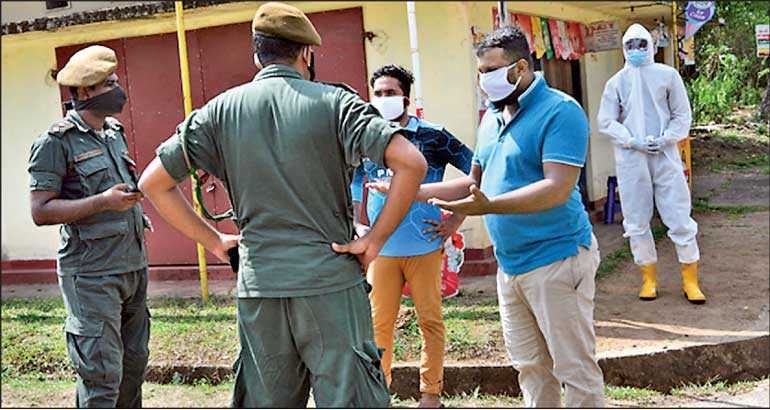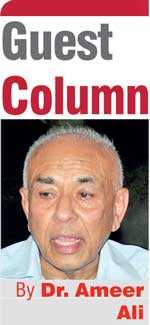Monday Feb 16, 2026
Monday Feb 16, 2026
Saturday, 30 May 2020 00:02 - - {{hitsCtrl.values.hits}}

Economists and experts can draw up plans and submit policy blueprints for action, but ultimately it is the ordinary people and their energy and contribution that will make the economy grow, stagnate or fall. If the ordinary hardworking men and women do not feel free to act and are subjected to various threats, harassments and obstacles, prospects of a healthy recovery will remain distant. GR’s dream of ‘prosperity with splendour’ will remain just a dream – Pic by Shehan Gunasekara
 COVID-19, with all its horrendous health and economic disasters, has been a blessing in disguise to a President who wants to rule with an iron fist and with or without a parliament. I have already described his militaristic management of COVID-19 as dress rehearsal for what is going to be the single most characteristic feature of his presidency (Colombo Telegraph, 11 April 2020).
COVID-19, with all its horrendous health and economic disasters, has been a blessing in disguise to a President who wants to rule with an iron fist and with or without a parliament. I have already described his militaristic management of COVID-19 as dress rehearsal for what is going to be the single most characteristic feature of his presidency (Colombo Telegraph, 11 April 2020).
The country is now governed by a ‘power cartel’, Immanuel Wallerstein’s domesticated version of State Cartel. This power cartel with GR as its numero uno, consists of controversial personalities from the tri-forces – army, navy and air force, two other Rajapaksa siblings MR and BR and a motely group of academics, businessmen and ‘political bikkus’. There is an appointed cabinet functioning under this cartel, but that cabinet is no more than a mouth piece of these real powerholders.
Already, GR had declared in no uncertain terms that all heads of public offices and their assistants must either carry out the orders issued from the cartel through the presidency or express their criticism and quit. In essence, command and coercion, and not consultation and compromise is the chief modality of Sri Lanka’s governance.
It is to gain some semblance of legitimacy to this coercive project that the cartel wants an elected government led by GR’s second in command, Premier MR. Victory at the next election with two-third majority is an imperative, because the constitution needs to be redrawn to bestow all powers to the President and make him the JR incarnate and more. With the support of the tri-forces, Sinhala Buddhist business and financial moguls, a subservient media and politicised prelates, the cartel is confident that GR would achieve what he wants.
The only stumbling block that is delaying this inevitability is a dysfunctional election commission, with at least one of its members standing firm and refusing to be coerced. The matter is now before the highest judicial body in the country, and whether that body also would be coerced to pronounce a favourable verdict only time will tell. The future of the parliament hangs in the balance.
Even if the court’s decision goes against the wishes of the cartel, and the election date is postponed beyond June 20, GR is not going to reconvene the dissolved parliament, and the cartel would continue to rule the country come what may. MR has already sounded that possibility, although not directly. Every move by GR in appointing top men from the tri-forces as head of various task forces, including health, was taken to cover that eventuality. It is with this political backdrop the country is now facing the biggest challenge in the economic history of the nation.
COVID-19 pandemic has not disappeared and is still alive and spreading, contrary to officially published report cards. According to one independent source, there had been a systematic underestimation of the actual number of COVID-19 infections, tested cases and deaths in order to contrive and sell a success story about the militarily managed corona-control operation. It had to be done to justify the case for an early election. For example, according to the independent source, the actual number of detected patients as at 24 May were 1,702 and not 1,141 as was officially reported. Corona testing had been done only in restricted clusters and repetitively.
The Director General of Health Services Dr. Jasinghe’s inconsistencies in reporting the actual situation only shows the predicament of responsible officers working in a coercive political environment. Nevertheless, work on economic recovery cannot wait until the pandemic disappears completely. In the absence of any vaccine, people have to accept the virus as part of life, take precautionary measures such as strict personal hygiene, social distancing and self-isolation if symptoms found, and move on. This will be the living pattern of human condition in post-COVID-19 ‘new normalcy’.
On the economic front, the enormity of task confronting the country cannot be underestimated. There are both external and internal constraints that have to be faced and overcome, even to achieve a modicum of success. Externally, unless Sri Lanka’s trading partners also recover simultaneously there will be less stimulus for recovery from that quarter. COVID-19 has treated every country it visited with equal severity. Having embraced the open economy model, some of the country’s critical sectors like tourism, and the apparel industry, will struggle to survive let alone recover. Even the export of labour to Middle East an attractive source of revenue will remain stagnant for some time. With economic sanctions against China looming, international trade will receive another massive hit, which will impact Sri Lanka negatively.
The country desperately needs foreign investment, but that investment is not going to flow in unless world economic prospects improve. Sri Lanka will have to offer extraordinarily attractive terms to entice foreign investors. The country is financially broke and it is in sheer desperation that the Central Bank has opened the doors for illicit money to enter with zero scrutiny, which in turn has alerted international institutions like Transparency International and the Financial Action Task Force, which may black list Sri Lanka as unsafe destination for foreign investors.
Whether the Governing body of the Central Bank was coerced by the power cartel to take that unsavoury decision one does not know. The bank is also entering into a currency swap deal with its counterpart in Delhi to the tune of more than one billion dollars. India is in a stronger wicket to gain more through this swap arrangement. Whether the East Terminal of Colombo Port will be part of the price paid for swap negotiations with Delhi one has to wait and see.
Given these external constrains, economic recovery has to be driven through internal stimulants. To shift the focus to domestic arena there are certain impediments that have to be removed, such as shortage of resource inputs, high cost of marketing, rapaciousness of middlemen and so on. Economists and experts can draw up plans and submit policy blueprints for action, but ultimately it is the ordinary people and their energy and contribution that will make the economy grow, stagnate or fall. If the ordinary hardworking men and women do not feel free to act and are subjected to various threats, harassments and obstacles, prospects of a healthy recovery will remain distant. GR’s dream of ‘prosperity with splendour’ will remain just a dream.
Beyond the economic impediments is the socio-political impediment of communal hatred and disunity that will make economic recovery slow and spasmodic. The country cannot achieve internally stimulated economic recovery while the nation remains disunited. The power cartel appears to underestimate the significance of this phenomenon. If there is one common thread that ties all constituents of the power cartel it is its belief in a Sinhala Buddhist political and economic order.
Among the constituents of the cartel, the priestly class of politicised bikkus, has no clue about the economy. All it wants is for Buddhists to dominate every branch of the country’s polity. The role of this class is different from that played by prelates of ancient past who tried to instil virtuosity in governance. Virtuosity does not mean dominance by Buddhists, although Buddhism should retain its foremost place. In the pluralist polity of Sri Lanka political bikkus have become a divisive element and a bulwark against the collective effort needed at the moment to achieve economic recovery.
This is not to condemn the entire Buddhist clergy, but to question the partisan role of ‘political bikkus’, who are advising the cartel. One writer wrote a few weeks back that the country is a ‘de facto theocracy’, which is not true. What is actually happening is that politicised monks are poisoning the atmosphere of inter-religious and inter-communal harmony in society. However, it is heartening to hear voices of sanity from the sangha, publicly criticising the damaging role of ‘political bikkus’. We hope the President and other members of the cartel listen to these voices.
It is worth remembering in this context, that it was a politicised monk who assassinated a former prime minister, SWRD. It is also worth repeating a story that circulated among the literati around that time about Sir John Kotalawela, the prime minister who preceded SWRD. Sir John was reported to have visited SWRD in the hospital, and while wishing the victim speedy recovery had reminded him that he (Sir John) ‘tied the dogs to the gate’, SWRD let them loose and they bit him. Whether this conversation actually happened, I cannot vouch, but knowing Sir John as a loose cannon, the story sounds credible.
Among the President’s other men are the army generals who are now heading civilian task forces, including health. The army’s military management of corona curfews, lockdowns and shutdowns brought mixed results. They had put thousands of families in unnecessary difficulties and deprived them of their breadwinners. Until 4 May for instance, more than 46,000 individuals had been arrested and over 12,000 vehicles had been seized. This over-policing has caused immense mental distress and poverty.
The Maligawata tragedy was a product of this blind imposition of lockdowns. In areas where there are concentrations of minorities, the behaviour of the army and police had been unusually ruthless. Apart from its traditional role as guardians of national security, it has now been allowed to taste power over civilian rule. Will it give up that power if an election is conducted and a new government elected? The army’s role has added to the prevailing disunity and dissatisfaction.
All in all, COVID-19, instead of bringing people and communities together to collectively strive for economic recovery, has divided and disunited them. Can the economic challenge be met with this disunity? It appears that the cartel believes in achieving economic recovery solely through the effort of Sinhala Buddhists. This short sightedness will cost the nation dearly and prolong the trough.
(The writer is attached to the School of Business and Governance, Murdoch University, Western Australia.)